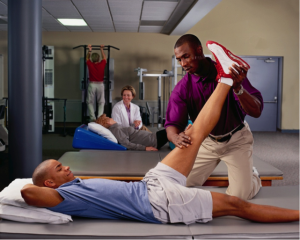Hip Dislocation Causes
Hip dislocations usually occur after large amounts of force are suddenly placed on the lower extremities. Commonly, this can occur during motor vehicle accidents, where the individual’s knee hits the dashboard, driving the femoral head (ball) backwards out of the hip socket.
However, hip dislocations can also occur secondary to falls from heights or in some cases, from even ground level falls. These forces cause the head of the femur to slip from the hip joint resulting in a dislocation. Patients with previous hip replacement surgery are more prone to experiencing hip dislocations of their involved hip without significant trauma.
Regardless of how the hip dislocation occurs, it should still be considered an emergency and should be evaluated by a doctor immediately.
Hip Dislocation Symptoms
 Hip dislocations can oftentimes be incredibly painful. In most cases, the patient will not even be able to move the effected leg, let alone walk around. In fact, these patients should not be allowed to try to bear weight on the effected side.
Hip dislocations can oftentimes be incredibly painful. In most cases, the patient will not even be able to move the effected leg, let alone walk around. In fact, these patients should not be allowed to try to bear weight on the effected side.
The reason why hip dislocations are considered emergencies is that oftentimes the dislocated femoral head may be putting direct pressure on the nerves around it. Significant nerve damage may occur during this injury if prolonged pressure on the nerves is allowed. This can result in a loss of sensation and even movement in the lower leg or foot.
Additionally, a dislocated hip puts stretch on the vessels that supply the head of the femur. If these vessels die as a result of prolonged stretch, the head can lose its blood supply and die as well (i.e. leading to femoral head osteonecrosis).
Hip Dislocation Diagnosis
Patients who have a hip dislocation are oftentimes in severe pain and usually are unable to move his or her leg. This can help make the diagnosis. Additionally, the position of the leg may appear abnormal when compared to the other side.
However, it is important to remember that sometimes patients may have only minimal symptoms with a dislocation. This is somewhat more likely to occur if a hip prosthesis becomes dislocated.
Ultimately, X-rays and perhaps other imaging studies will be needed to confirm the dislocation and look for any additional injuries that may have occurred during the initial incident. If there are other injuries, surgery may be required to appropriately treat all associated injuries. Your doctor will perform a thorough physical examination and look at all information available to rule out any other associated injuries.
Hip Dislocation Treatment
If diagnosed and managed early, hip dislocations can oftentimes be successfully treated without any significant long-term complications. Most often, the patient’s hip can be manipulated back into place (called a closed reduction) while the patient is just slightly sedated. If the hip remains dislocated despite initial attempts to close reduce it or if there are additional fractures in the area found on imaging studies, surgery may be needed.
Once the hip is treated, physical therapy may be needed after the closed reduction or surgery. Additionally, the patient’s mobility may be limited for sometime after the injury and he/she may require walking aids to mobilize.
Hip Dislocation Complications
If you suspect that you or someone else has a hip dislocation it’s important to seek emergency medical treatment immediately to prevent further damage down the road or additional injury now.
The likelihood of a good outcome goes down the longer treatment is delayed. Problems such as arthritis are much more likely in those who delay treatment. These issues may significantly limit activity or mobility now or later in life.
Call 911 or your local emergency department if you suspect that you or someone you know has a hip dislocation.
Note that the information in this article is purely informative and should not be used in place of recommendations from your treating physician.
